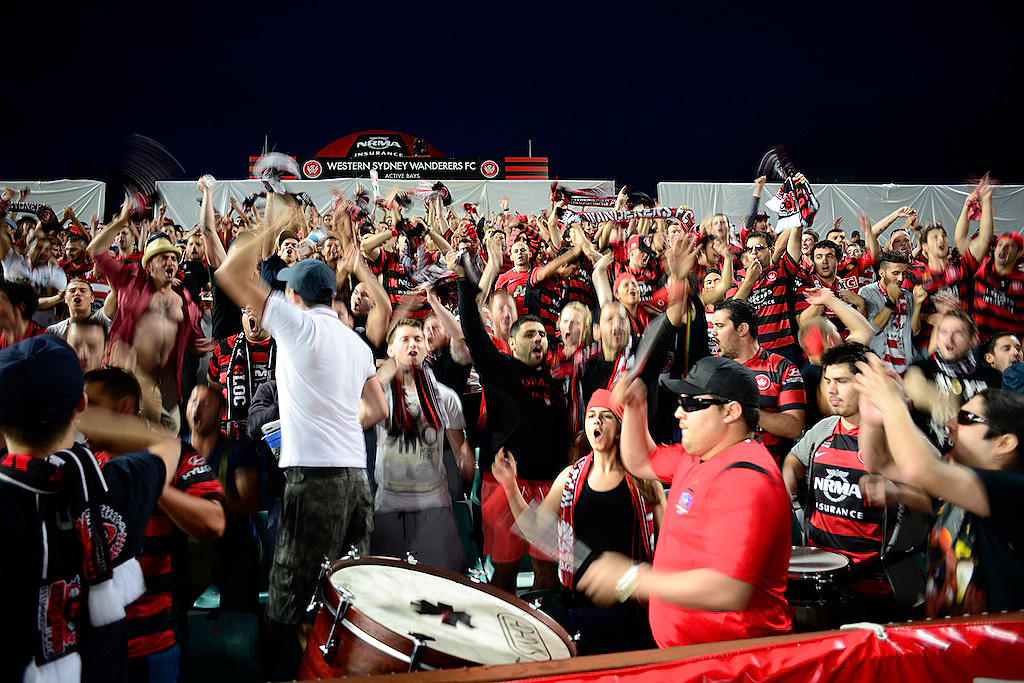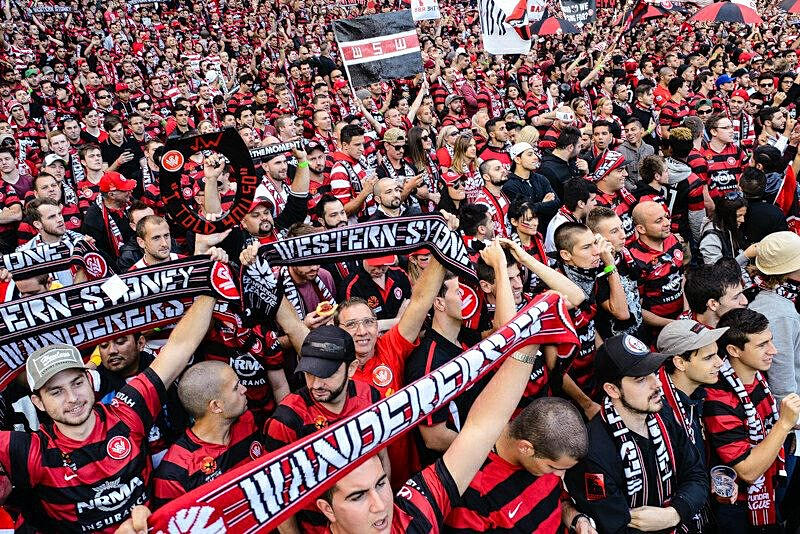
This week Parramatta found itself the shocking scene of terror тАФ the sort of thing you might expect in foreign nations, but which many Australians surely believed would never happen on our streets.
This was not the tragic shooting death on October 2 of Curtis Cheng by 15-year-old Farhad Jabar, himself shot dead by police. It was the loud and passionate march through Parramatta's streets six days later by hundreds of fans of the football (soccer) club Western Sydney Wanderers. They were on their way to the Wanderers' A-League season opener against Brisbane Roar at Parramatta (Pirtek) Stadium.
Led by the Red and Black Bloc (RBB) supporters' group and with seemingly no thought as to the damage to society they were causing, the chanting mob jumped about and waved scarves, flags and hands тАФ going so far at some points as to clap their hands above their heads.
All the horrified spectators forced to witness such a terrifying display could do was grin, clap and record the whole thing on their smart phones.
Children were present тАФ in the march and on the sidelines тАФ and we can only speculate on what mental scars they will carry for the rest of their lives. Some impressionable young minds might even be so тАЬradicalisedтАЭ by the experience as to move away from mainstream activities like playing rugby league and ask for a soccer ball for Christmas instead.
And the worst thing was that the police simply stood there and let it happen.
We should be clear, though, that this was not the fault of the hard-working men and women in blue. The NSW Police Force did its best to save society from this horror.
Police propose bans
The traditional RBB march, which parades through Parramatta before every Wanderers home game, was specifically mentioned in a long list of things the NSW Police Force told Wanderers management they wanted banned in the lead-up to the start of a new season.
Never mind that the police have no authority to ban any march at all. It was there on the list тАФ along with other activities the RBB was to be stopped from engaging in, including clapping above their heads, and тАЬjumpingтАЭ or engaging in тАЬside-to-sideтАЭ movements. In other words, pretty much anything that the RBB and many other fans actually do during games.
Unfortunately for police, the RBB went public with these . The result, among Wanderers fans and the wider community, was shock and disbelief.
The RBB is an тАЬactive supportтАЭ fan group of the sort you find at other A-League clubs and football clubs around the world. Active supporters sing, chant, dance, jump about, wave banners and flags and do whatever they can to generate noise, colour and passion in support of their team.
The levels of enthusiasm and encouragement for the team this can generate have lead active support groups to sometimes be called the тАЬ12th playerтАЭ.
The RBB is considered an especially successful example of active support in this country and is credited with being a big factor behind the success story of the Wanderers club, which was only founded three years ago.
But the RBB has also faced repeated demonising by a racist media over supposed violence or other alleged anti-social behaviour, extremely heavy policing and a Football Federation of Australia (FFA) terrified of bad media that imposes draconian restrictions.

FFA restrictions
Fans of the roundball game in Australia have long been subjected to bizarre and extreme restrictions by the FFA, which goes so far as to .
Many fans have been banned from any FFA event for up to 10 years тАФ often on completely spurious grounds, including incidents that had nothing to do with football, don't coincide with any FFA events and are nowhere near any sporting ground.
Under FFA regulations, there is no serious right to appeal and banned fans often don't know the evidence used against them. Fans are sometimes banned automatically when charged with a criminal offence тАФ and even if they are cleared in court, the FFA refuses to reverse the ban.
There is now a Senate inquiry into the FFA over governance issues and possible corruption in Australia's World Cup bid. Fans subjected to unfair bans have also been asked to appear to discuss their experiences.
This has raised hopes among football supporters that, with the unjust nature of the FFA's regime getting a public airing, .
All football fans suffer in this atmosphere, but Wanderers supporters have been especially singled out тАФ particularly by police, whose heavy presence at Wanderers games make fans feel like criminals just for showing up. This is despite the fact research shows that, on average, .
The treatment meted out to Wanderers fans can seem mystifying. Why bother with this level of harassment of mere football fans? But it is not hard to feel that it has racial and class overtones тАФ due to the club's multicultural fan base from the western suburbs.
The police seem to resent young ethnic men and women organising themselves on their own terms, and often not bothering to hide their distrust of police and the corporate media. And then, when police and the corporate media try to put Wanderers fans back in their place, the response is pride and a determination not to be cowed.
Others have hailed the RBB for creating a positive, multicultural group who have brought fresh passion and energy to Australian football, a sense of unity and purpose to diverse groups in western Sydney and which has raised thousands of dollars for charity тАФ including fundraising for dozens of free tickets for refugee children and others from disadvantaged backgrounds.
The outcry generated by police demands spread widely. supporting Wanderers fans and opposing the police crackdown.
Along with , the Professional Footballers Australia, the A-League players union, also the police proposals. The backlash was so strong it was soon clear the police had overplayed their hand.
The RBB made it clear it had no intention of accepting the restrictions тАФ and would most certainly be marching. Feeling the pinch, the club, which actually pays for the police presence at games, also .
Police backdown
The police were forced into a humiliating back down. On the night of the first game on October 8, the police clearly agreed to stay out of the terraces where possible and to make themselves relatively scarce.
Compare this to the last game at Parramatta Stadium last season, where the large, aggressive police presence caused chaos by responding to a flare being lit by pepper-spraying the crowd in the RBB area indiscriminately, including children. Use of flares is banned by Australian law, but the collective punishment, which resulted in a 12-year-old being hospitalised, caused the RBB to leave the stadium in protest.
On October 8, as the RBB created noise and colour on the terraces and Wanderers players on the pitch squandered chance after chance to lose 3-1 to Brisbane on the back of some shocking defending, there were no crowd тАЬincidentsтАЭ.
This was not surprising. With police in far smaller numbers than at any recent Wanderers game, and with clear тАЬhands offтАЭ instructions, the actual тАЬtrouble makersтАЭ had been put on a leash.
It would be naive to assume the issues are all resolved. The police may well look for excuses to step up harassment once more. Other big issues, such as FFA bans and other unfair attacks on football supporters, remain unresolved. But the score off the pitch on the night of October 8 was RBB 1 тАУ Police 0.
[Stuart Munckton is Western Sydney Wanderers supporter who takes part in RBB-led active support. He is also a member of the .]

Like the article? Subscribe to 91╫╘┼─┬█╠│ now! You can also us on Facebook and on Twitter.